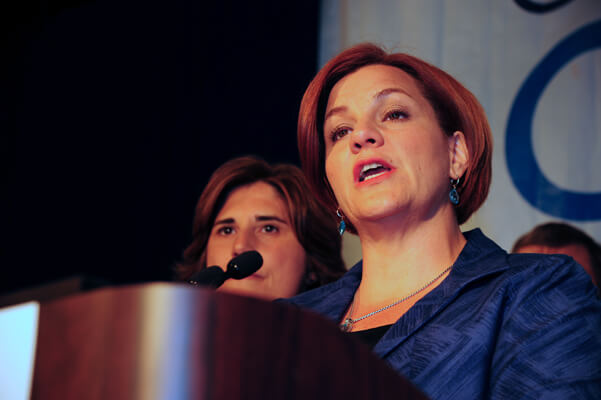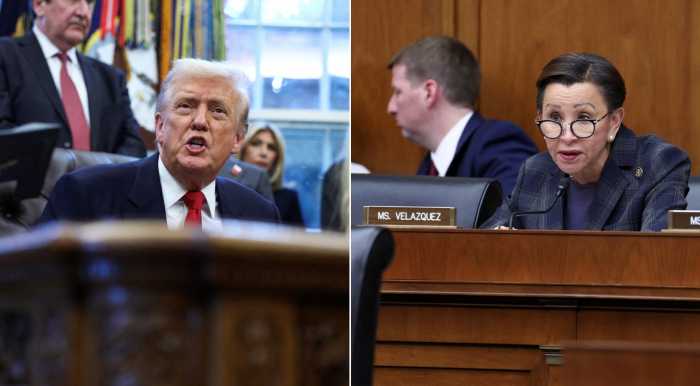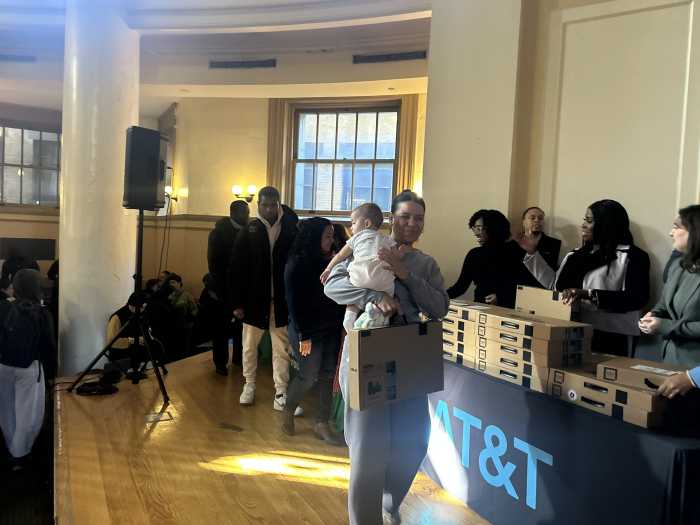City Council Speaker Christine Quinn concedes the Democratic mayoral primary last month. | DONNA ACETO
As Christine Quinn’s 14 years in the City Council come to a close, some community groups are expressing concern that they are losing a sympathetic leader who steered millions of city dollars into their coffers.
“As far as HIV, we lose an ally,” said Lyndel Urbano, the manager of government affairs at Gay Men’s Health Crisis (GMHC), an AIDS services group. “She has been somebody who has really gone to bat for those living with HIV, particularly those who rely on [HIV/ AIDS Services Administration, or HASA] services.”
Quinn was first elected to the Council in 1999 and became speaker in January 2006. An out lesbian who represents Chelsea and the West Village, Quinn, some advocates say, quickly grasped the need for funding projects. But it was not simply the money that mattered. Quinn did not need extensive lobbying or argument.
Advocates recall Council speaker “got it,” but de Blasio spurs comfort as well
ACRIA, also an AIDS services group, launched a multi-year study on AIDS and aging in 2003 that was supported with City Council money. A typical politician might not immediately appreciate why such a study is needed.
“You could just skip to the chase,” said Daniel Tietz, ACRIA’s executive director and a longtime Democratic Party activist. “There was no persuasion. That will be missed… HIV and aging issues. You spoke to Quinn about it, done.”
Major programs are not the only things at risk. The City Council has funded services at the Lesbian, Gay, Bisexual & Transgender Community Center that allow the Center to field thousands of phone calls per week from people seeking information about the community and about coming out.
“We sort of are the 311 of New York City for LGBT people,” said Glennda Testone, the Center’s executive director. “That’s the fear in the back of my mind, that that might be de-prioritized.”
Each of the groups interviewed for this story estimated that they had received millions in City Council funding. Under Quinn, the City Council has restored funding or spent its discretionary funds to pay for programs at other gay and AIDS groups.
Tietz also credited Quinn with opposing Mayor Michael Bloomberg, who regularly sought to cut AIDS services in the city budget and attempted to scale back spending at HASA, the city agency that links people with AIDS to housing and other services.
“At the end of the day, Christine Quinn was left to negotiate on behalf of people she cared about the most, and that included people with HIV and the gay community,” Tietz said. “I think that Christine Quinn did yeoman’s work on behalf of the HIV community in pushing back against a mayor who was disinclined to be responsive.”
But Quinn also touted her good working relationship with Bloomberg and that appears to have hurt her among Democrats. Some voters were enraged when she engineered a change in the city’s term limits law on the eve of the 2009 election year that allowed Bloomberg and Quinn to serve third terms. She angered progressive voters when she delayed for several years a vote on a paid sick leave bill in the City Council and was late in challenging some police practices, such as stop and frisk.
The presumed frontrunner in the Democratic primary for months, Quinn won just 15 percent of the vote. Bill de Blasio, the city’s public advocate, prevailed with just over 40 percent and Bill Thompson, the former city comptroller, won 26 percent.
Quinn narrowly lost Chelsea to de Blasio, whose campaign was an “unapologetic progressive alternative,” he said after winning the September 10 primary, and he pummeled Quinn in the West Village. De Blasio’s campaign was also an appeal for change after 12 years of Bloomberg.
Quinn won 34 percent of the queer vote to de Blasio’s 47 percent, according to exit poll data from Edison Research Services, a New Jersey polling firm.
Any funding cuts the groups may see could not come at a worse time. The federal budget sequester, which implemented automatic cuts, has already reduced budgets. Some groups, notably GMHC, have received cash from Bloomberg through Bloomberg L.P., his private company, and via his foundation giving. The mayor may discontinue those donations after he leaves office and has less need to quiet critics with his cash.
The groups have already begun the process of reaching out to new City Council members and to de Blasio, who appears to be set to easily win City Hall on November 5.
“Whenever someone starts in a new role, they need to be educated,” said Urbano. “Fortunately, we still have allies in the City Council.”
Roughly 40 percent of the City Council seats will be held by new members in 2014 and if de Blasio maintains his campaign posture as he governs, it could be that both sides of City Hall will be more left-leaning.
“On the face of it, it looks as if it will be more progressive than the Council we have had,” Tietz said, in comparing next year’s prospects to the existing status quo. “I actually have great hopes for a Mayor de Blasio. I think his politics are better, I think his policy impulses are better.”


















